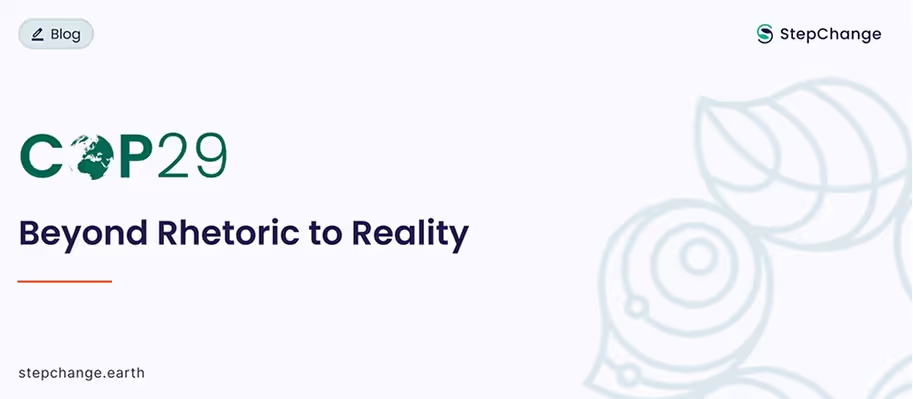
Solutions
Carbon Management
ESG Intelligence
Climate & Nature Risk
Data Registry
Beta
Sector
Get started, schedule a demo or request a free assessment!


The stakes couldn't be higher as the world descends upon Baku, Azerbaijan, for COP29 this November. This isn’t just another item on the climate calendar; it's a critical juncture where we decide the fate of our planet. With COP28’s echoes still reverberating—where the phrase “beginning of the end” for fossil fuels was tossed around like confetti—there’s a palpable urgency to deliver on promises and confront the realities ahead.
Azerbaijan finds itself in a curious position as host nation, standing at the crossroads of ambition and accountability. The COP29 Presidency has laid out its two main pillars: “Enhance Ambition, Enable Action.” Yet, as Manuel Pulgar-Vidal from WWF aptly noted, these initiatives alone won’t catalyze the systemic changes required to tackle climate change effectively.
The challenge is clear: we need a just transition away from fossil fuels, robust climate finance mechanisms, and ambitious Nationally Determined Contributions (NDCs) that align with scientific recommendations. The clock is ticking louder than a countdown timer on a game show, and if Azerbaijan doesn’t shift gears soon, we may find ourselves in a situation where the window for limiting global warming to 1.5°C slams shut faster than you can say “tantrum.”
Interestingly, COP29 has been dubbed the “Truce COP,” inspired by the ancient Olympic Games' tradition of ceasefire. This initiative aims to highlight not only the need for peace but also to address how military activities contribute significantly to global emissions—estimated at 5.5%. As Yalchin Rafiyev, Azerbaijan's Deputy Foreign Minister, stated, this call for a truce is not merely symbolic; it’s a recognition that every sector must contribute to reducing emissions.
However, one can’t help but raise an eyebrow at the irony: can a country that is itself a significant fossil fuel exporter genuinely champion such ideals? Azerbaijan must navigate this delicate balance if it hopes to lead by example without stepping on too many toes.
One of the most pressing issues on the agenda is climate finance. The New Collective Quantified Goal (NCQG) is set to replace the previous $100 billion annual target aimed at supporting developing nations. This new goal must be ambitious enough to meet the needs of those most vulnerable to climate impacts. As Rafiyev pointed out, “If we adopt this decision... particularly the developing countries will have raised confidence towards the international climate architecture.”
However, skepticism hangs heavy. Past failures—like developed countries missing their funding targets—cast a long shadow over current negotiations. The urgency for at least $1 trillion in climate investments by 2030 cannot be overstated. If Azerbaijan fails to secure substantial commitments, COP29 risks becoming another hollow conference filled with empty promises.
Azerbaijan must also prepare for intense scrutiny from civil society and media. Transparency and engagement will be crucial in avoiding distrust and accusations of co-opting COP29 for fossil fuel interests. As Mukhtar Babayev, COP29 President-Designate, emphasized, “Creating enabling conditions and encouraging countries to implement existing commitments can have the greatest impact.”
However, sporadic consultations won’t cut it. Continuous dialogue with credible stakeholders is essential if Azerbaijan hopes to avoid pitfalls that have plagued previous conferences. The specter of civil society being sidelined looms large; if this happens again, it could lead to an uproar that undermines any progress made.
As we look toward COP29, several key themes will likely dominate discussions:
Here are the key points in teh agenda to focus on:
The agenda reflects an ambitious effort by Azerbaijan as host nation to drive action across multiple climate pillars—energy, finance, agriculture, cities, human development, and the climate-peace nexus. As Yalchin Rafiyev pointed out, this call for a truce is not just symbolic; it recognizes that every sector must contribute to reducing emissions.
The road ahead is fraught with challenges but brimming with potential. Azerbaijan has a chance to not only advance negotiations but also forge a legacy for future generations. By setting clear timelines, leveraging expertise, and pressuring countries for tangible results, COP29 could be a turning point in our fight against climate change. As we inch closer to November, let's hope Azerbaijan rises to the occasion – not just as a host, but as a leader willing to confront uncomfortable truths and champion genuine change. After all, when it comes to our planet's future, every fraction of a degree matters, and we're all in this together.

.svg)